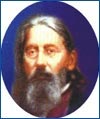Skunk Cabbage. Aracea.
Experiment by Bigelow, Amer. Medorrhinum Botany, vol. 2, p. 48. Symptoms in Jahr’s Symptomatology are from provings by C. Hering and others.
MIND.
Cross ; impetuous ; inclined to contradict.
Absence of mind and inattention ; enters sick room without knocking, does not listen to patient.
SENSORIUM.
Vertigo and dimness of sight.
INNER HEAD.
Headache on single places, lasting a short while, then changing place ; dulness ; pressing in temples now more in one, then more in the other, with violent pulsation of arteries.
Drawing in forehead in two lines from protuberances to glabella, where it draws outward as from a magnet.
SIGHT AND EYES.
Dimness of sight, with vertigo.
SMELL AND NOSE.
The nose is swollen as far as the nasal bones extend, red like a saddle, sore to touch, < left side.
Cartilage cold and bloodless, with red spots on cheeks and small pimples on left side of face.
Violent sneezing, with pains in palate, fauces and oesophagus to stomach, hurting for a while after in cardiac end of stomach.
FACE.
Swollen submaxillary glands.
TEETH AND GUMS.
Scurvy.
TASTE, SPEECH, TONGUE.
Numbness of tongue, cannot touch teeth with it.
Papilla elevated.
Tongue red and sore on tip and edges.
PALATE AND THROAT.
Burning from fauces downwards through chest.
sophagus painful on sneezing.
APPETITE, THIRST, DESIRES, AVERSIONS.
Inclined to smoke, but it does not taste good.
HICCOUGH, BELCHING, NAUSEA AND VOMITING.
Nausea and vomiting.
SCROBICULUM AND STOMACH.
With every firm step, pain in pit of stomach as from something breaking loose.
ABDOMEN AND LOINS.
Expansion and tension in abdomen.
Pain in abdomen here and there, in single spots.
When walking sensation as if the entrails were hanging loose and flabby, without any pain.
URINARY ORGANS.
Great urging ; urine darker.
MALE SEXUAL ORGANS.
Titillation voluptuous, but painful, around corona glandis.
FEMALE SEXUAL ORGANS.
Amenorrhoea.
RESPIRATION.
Spasmodic asthma.
Sudden anxiety, with dyspnoea and sweat, followed by stool and relief of that and other complaints.
Inclined to take a deep breath ; with hollowness of chest ; with constriction in fauces and chest.
Asthma, aggravated or caused by dust. θ Heaves in horses from dusty hay.
COUGH.
Spasmodic cough.
Senile catarrh.
INNER CHEST AND LUNGS.
Pain in chest and in axilla ; seems to have a connection with burning in oesophagus.
OUTER CHEST.
Pressing pain on sternum.
NECK AND BACK.
Glands on throat swollen.
LOWER LIMBS.
Aching along right cresta tibia.
REST, POSITION, MOTION.
With every firm step : pain in pit of stomach as from something breaking loose.
When walking : sensation as if entrails were hanging loose and flabby.
On sneezing : painfulness in oesophagus.
NERVES.
Hysterics.
** Epilepsy.
SLEEP.
Sleepiness early in evening.
TEMPERATURE AND WEATHER.
All complaints disappear in open air.
LOCALITY AND DIRECTION.
Right : aching along cresta tibia.
Left : small pimples on side of face.
Outward : drawing in forehead.
SENSATIONS.
Erratic and spasmodic pains.
Drawing as if from a magnet in forehead ; pain in pit of stomach as from something breaking loose ; as if entrails were hanging loose and flabby, without pain.
Pain : in palate ; in fauces ; in oesophagus to stomach ; in pit of stomach ; in abdomen here and there in single spots ; in chest and in axilla.
Painful titillation : around corona glandis.
Pressing pain : in sternum.
Drawing : in forehead, in two lines from protuberances to glabella, where it draws outward as from a magnet.
Pressing : in temples, now in one, then in the other.
Aching : along right cresta tibia.
Burning : extends from fauces downwards through chest.
Soreness : of tip and edges of tongue.
Violent pulsation : of arteries of temples.
Expansion and tension : of abdomen.
Constriction : of fauces and chest.
Dulness : in head.
Numbness : of tongue.
TISSUES.
Spasmodic asthma ; senile catarrh.
Dropsy.
Chronic rheumatism.
TOUCH, PASSIVE MOTION, INJURIES.
Touch : nose sore ; tongue numb, cannot touch teeth with it.
Herpes and cutaneous affections.
STAGE OF LIFE, CONSTITUTION.
Catarrh of aged persons.
RELATIONS.
Compare : Arum triph., Asafoetida, Mephit.
“NOTE:
PLAIN TEXT : LOWEST & DESIGNATES AN OCCASIONALLY CONFIRMED SYMPTOMS;
Plain blue: MORE FREQUENTLY CONFIRMED;
BOLD BLUE : SYMPTOMS VERIFIED BY CURES;
BOLD RED : REPEATEDLY VERIFIED;
$BOLD ITALIC RED$ : AN APPROVED CHARACTERISTIC;
θ : STANDS BETWEEN CURED SYMPTOM & PATHOLOGICAL CONDITION;
** : OBSERVED FROM OLD SCHOOL OR NEW SCHOOL;
toxic : Toxicology;
r : Right;
l : Left;
< : Increased or aggravation;
> : Decrease or amelioration;
^^ : Symptoms observed only on the sick “

